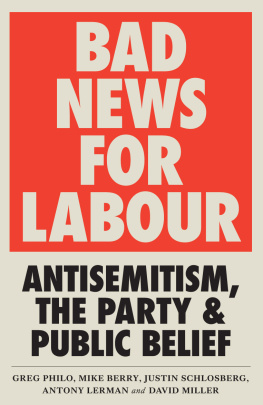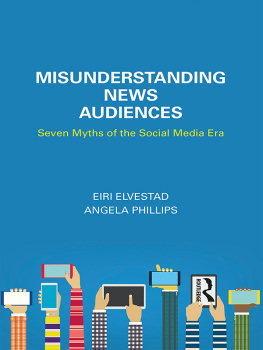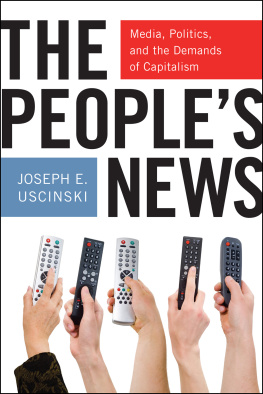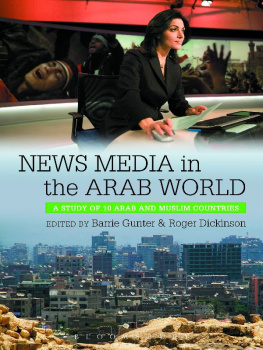More Bad News From Israel
By the same authors
ISRAEL AND PALESTINE
Mike Berry and Greg Philo
(Pluto Press, 2006)

First published 2004 as Bad News From Israel
This expanded and updated edition first published 2011 by Pluto Press
345 Archway Road, London N6 5AA
www.plutobooks.com
Distributed in the United States of America exclusively by
Palgrave Macmillan, a division of st. Martins Press LLC,
175 Fifth Avenue, New York, NY 10010
Copyright Greg Philo and Mike Berry 2004, 2011
The right of Greg Philo and Mike Berry to be identified as the authors
of this work has been asserted by them in accordance with the Copyright,
Designs and Patents Act 1988.
British library Cataloguing in Publication Data
A catalogue record for this book is available from the British Library
ISBN 978 0 7453 2979 6 Hardback
ISBN 978 0 7453 2978 9 Paperback
ISBN 978 1 7837 1075 1 ePub
ISBN 978 1 7837 1076 8 Mobi
Library of Congress Cataloging in Publication Data applied for
This book is printed on paper suitable for recycling and made from fully managed and sustained forest sources. Logging, pulping and manufacturing processes are expected to conform to the environmental standards of the country of origin.
10 9 8 7 6 5 4 3 2 1
Designed and produced for Pluto Press by Chase Publishing Services Ltd
Acknowledgements
We would like to thank other members of the Glasgow university Media Group who helped us and gave advice and encouragement: John Eldridge, David Miller, Jacquie Reilly and Emma Miller. Thanks especially to Ruth Moore and Etta Gaskill who gave a great deal of time and energy to data preparation on the project. Thanks to Bernard Glancy for filming and also to Aidan Warner and Michelle Tonge for their help in preparing press reports. Thanks to others in the Department of Sociology: Andy Furlong, Giuliana Tiripelli, chen Li, Emma Briant, Adrian Quinn, Yue Li, Ruth Madigan, Kathleen Ward, Lynn campbell, olive Kearns and Maureen McQuillan. Thanks also for help and advice to Avi Shlaim, Nachman Shai, David Ruben, Joy Wolfe, Ghada Karmi, Justin Lewis, Frank Webster, Lucretia chauvel, David Morley, James curran, Daya Kishan Thussu, Georgina Sykes, Mary Philo, David Anderson, David McLennan, Norman Finkelstein, Ian Lustick, Baruch Kimmering, Roane carey, Gershon Shafir, Shaul Mishal and Geoffrey Aronson. For help in transcription, preparation of manuscripts and organising interviews, thanks also to Daniela Latina, Daniela Dudysova, Luke Nicholas, Scott Gordon and Anna Terje.
Many people helped in the development and setting up of interviews and focus groups. Thanks especially to ursula Grimberg and to Lyndall oBrien. Special thanks also to Anna and Iain Semple, Margaret and Andrew Dunn, Phillip Radcliffe, claire Wood, Daniel Green, Phoebe Maine, Adele cowie, Margaret and Keith Bradly, Gregor Mill, Mike Phillips, Jenny owen and Sarah and John Philo.
Thanks also to all the journalists and media practitioners who spoke with us and who gave help and advice: George Alagiah, Brian hanrahan, Tim Llewellyn, Lindsey hilsum, Ken Loach, Adrian Monck, Gaye Flashman, John humphrys, Sian Kevill, chris Shaw, Gary Rogers, Fran unsworth, Sue Inglish, Evan Davis, Paul Adams, Nik Gowing, John underwood, Alex Graham, Sandy Ross, Paul McKinney, John Pilger, David cowling, Robin Lustig, Marie colvin, Rodrigo Vazquez, Alan hayling, Leon Barkho, Jack Enright, colin Brierly and Donald McLeod, and the staff at Pluto Press: Anne Beech, Robert Webb and other members of the production team. Finally thanks again to all those people who took part in producing this work and who gave so much of their time and energy so freely and with such good grace.

Final Status Map Taba, January 2001 (Andras Bereznay, adapted from Jan de Jong and the Foundation for Middle East Peace, 2001)
Introduction
This is the second edition of our study, originally published as Bad News from Israel. It includes our earlier findings plus a new study of the Israeli attack on Gaza, from December 2008 to January 2009, and new analysis of audience understanding and responses. The first edition began with a history of the conflict which we have now updated to include other major events such as the Palestinian elections and the Lebanon war of 2006 and the recent history of Gaza. We wrestled with the idea of simply bringing out a new book with the new material. But it was obvious that we couldnt divide the history section and simply start where we had left off. We also wanted to cross reference our analyses of news content between different periods of the conflict and to compare the full range of audience samples. In the end we decided it was more useful to keep all of the results together. So this is a new introduction for both the original material and for the new studies included in this volume. We also include here a discussion of the public debate about media coverage, which has developed since the publication of the first study.
It need hardly be said that the Israeli-Palestinian conflict is one of the most problematic with which journalists have to deal. After our first publications in this area, many commented to us on the pressures which they felt in reporting it. They were working in a political climate in which the British government was closely allied to the US, which in turn had Israel as a key ally. The Israeli state had developed a very extensive lobbying and public relations capacity in both the US and the UK. Politicians from the US speaking on television in Britain have routinely voiced their support for Israel, as have significant parts of the British press. Tony Blair, after being prime minister of the UK, was appointed in 2007 as Middle East envoy in the search for peace. Yet his lack of neutrality is sometimes manifest. Consider this interview which was filmed during the Israeli attack on Gaza, in January 2009. The ITN correspondent begins by stating that:
Correspondent: Mr. Blair believes that the key to a ceasefire lies in stopping Hamas smuggling weapons through these tunnels into Gaza.
Blair then gives his very critical view of Hamas, noting how Gaza can be used as a base for directing rockets at civilians in Israel:
Tony Blair: Either Hamas agree to be part of the solution, or alternatively Hamas stay in Gaza, using Gaza as a base for operations, directing rockets at civilians in Israel, in which case they are not part of the solution, they are part of the problem.
He is then repeatedly asked if he will also condemn Israels use of force on Gaza as disproportionate. To which he first replies:
Tony Blair: The most important thing for me to do as international community representative is to try and get this thing stopped.
And then:
Tony Blair: Look there is nothing that can take away the fact that when military action of this sort happens there are innocent civilians that suffer and the people of Gaza are suffering badly. The most important thing for me to do, rather than condemning one side or the other, is actually get the thing sorted and thats what I am trying to do. (ITV early evening News, 6 January 2009)
So when Hamas fires rockets and 13 Israelis are killed, they are part of the problem, but when Israel attacks Gaza and over 1,000 Palestinians are killed, then this is the sort of thing that happens when military action takes place. It can be seen that journalists who do try to feature both sides of the conflict are facing something of an uphill task. There is less to fear in criticising the Palestinians, but to criticise Israel can create major problems. Journalists spoke to us of the extraordinary number of complaints which they receive. We have presented our findings to many groups of media practitioners. After one such meeting a senior editor from a major BBC news programme told us: we wait in fear for the phone call from the Israelis. He then said that the main issues they would face were from how high up had the call come (e.g., a monitoring group, or the Israeli embassy), and then how high up the BBC had the complaint gone (e.g. to the duty editor or the director general). He described how journalists had checked with him minutes before a programme was broadcast on which words to describe the conflict, should now be used. On another occasion, the journalist and filmmaker John Pilger told us of the storm of criticism which followed the broadcast of his film,







